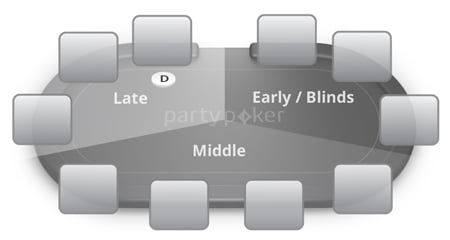How to play
Poker starting hands: playing the right cards at the right time
Starting hand selection is one of the first skills poker players learn. As the term suggest, starting hand selection is deciding which hole cards you will play before the preflop betting round. There are 169 distinct starting hands in Texas Hold'em, but they are not created equally. Some perform well regardless of your position at the table, others should only be played in late position, while others should be ditched at the first opportunity.
Poker players are usually labelled as loose or tight depending on the starting hands they play. Loose players have lesser starting hand requirements than someone who is tight so, therefore, they play more hands. There is no right or wrong way to play poker; you pay your money, you play how you wish. However, it is common knowledge that new players should adopt a tight style of play -- that is play fewer but stronger hands – while they are still learning poker's nuances.
The information you are about to absorb relates to playing a tight-aggressive style, which is ideal for newer players. Playing fewer but stronger hands and utilizing the power of position helps you to have fewer difficult decisions after the preflop betting round, which in turn results in you making less mistakes.
Hole cards |
Late | Middle | Early/Blinds |
|---|---|---|---|
| Ace Ace | Re-raise | Raise | Raise |
| Ace King | Re-raise | Raise | Raise |
| Ace Queen | Re-raise | Raise | Raise |
| Ace Jack | Play | Play | Check/Fold |
| Ace Ten | Play | Suited | Check/Fold |
| Ace Nine | Suited | Check/Fold | Check/Fold |
| Ace Two | Suited | Check/Fold | Check/Fold |
| King King | Re-raise | Raise | Raise |
| King Queen | Re-raise | Play | Check/Fold |
| King Jack | Play | Suited | Check/Fold |
| King Ten | Play | Check/Fold | Check/Fold |
| King Nine | Play | Check/Fold | Check/Fold |
| Queen Queen | Re-raise | Raise | Raise |
| Queen Jack | Play | Suited | Check/Fold |
| Queen Ten | Play | Check/Fold | Check/Fold |
| Queen Nine | Play | Check/Fold | Check/Fold |
| Jack Jack | Re-raise | Raise | Play |
| Jack Ten | Re-raise | Suited | Check/Fold |
| Ten Ten | Re-raise | Play | Play |
| Ten Nine | Suited | Suited | Check/Fold |
| Nine Nine | Play | Play | Check/Fold |
| Seven Seven | Play | Play | Check/Fold |
| Six Six | Play | Check/Fold | Check/Fold |
| Two Two | Play | Check/Fold | Check/Fold |
Re-raise
Re-raise
You're in a strong position here, so go for it. This is your chance to take control.
Raise
Raise
You've got good cards in a good position. see if you can make them count with a solid and confident raise.
Play
Play
Play these cards, but watch out - your opponents' may be stronger. If people are raising in front of you, you may have to fold.
Suited
Suited
Only play these cards if they're the same suit.
Check/Fold
Check/Fold
If you have the opportunity to see the flop for free, check, if not fold your hand.
Table positions

Why Does Your Table Position Influence Your Starting Hand Selection?
Take a look at the handy starting hands colour coded table above, and you will quickly notice that strong starting hands can be played from anywhere at the table, and should be played aggressively. Conversely, weaker holdings tend to be folded in the early positions, and only played when you have a positional advantage. Why is this?
Utilizing the power of position in poker is something every winning player does. If you looked at the MyGame Whiz statistics for every winning PartyPoker player, they would all lose money in the blinds and perhaps early position, win some money in middle position, and enjoy the most profits from late position, particularly on the button. This trend is not coincidence; your position plays a significant role in your long-term profits.
Visualize the graphic in the above Table Positions section while you discover why position is so important in Texas Hold'em. Imagine you are seated in under the gun, the first seat in early position and have a pair of sixes in the hole. Pairs look pretty and one pair is often the best hand at showdown, but small pairs are vulnerable to bigger pairs, or overcards.
A Small-to-Medium Pair Under the Gun
If you decide to open for a raise with pocket sixes from under the gun, there are another nine players to get through, and the odds of one of them holding a stronger or playable hand are significant. What do you do if someone three-bets (re-raises) you? What is your plan if someone calls the raise?
Unless the call or raise comes from a player in the small or big blind, you will be first to act for the remainder of the hand which is not an ideal spot to be in. Being out of position makes you vulnerable to bluffs and makes it challenging to control the size of the pot.
A Small-to-Middle Pair on the Button
Let's stay with the same pocket sixes except this time we are on the button in late position and everyone has folded around to us. In this scenario, we only have the small and big blind to worry about. The blinds are less inclined to call a raise because they will be out of position for the remainder of the hand. An opening raise from the button with pocket sixes will force the blinds to fold a large percentage of the time. If one of them does call, you have positional advantage over them, and can fire a continuation bet.
For example, you raise from the button with 6c-6s, the big blind calls, the flop falls Ks-4d-2h, and the big blinds checks. You can safely make a continuation bet representing the king or another strong, made hand, and the big blind is unlikely to continue in the hand unless they have the goods; they may even fold a seven in this spot!
Some Hands Can Be Played From Anywhere
There are some powerhouse Hold'em starting hands that can and should be played from anywhere at the table. They are so powerful that you do not care if an opponent calls or re-raises. Indeed, with hands like pocket aces and kings you are willing an opponent to get frisky and build a pot.
Super-strong hands like aces, kings, and queens, do not often come around, so it is important you make the most of them. Open pots with raises from any position with these hands, and throw ace-king, ace-queen, and pocket jacks into the mix for good measure. With aces, kings, queens, and ace-king, you should be looking to re-raise anyone that has raised before you because we want to build a larger pot that we are statistically favorite to win.
When you are in late position, feel free to add more starting hands to your re-raising range, especially if the initial raise comes from a player in one of the later positions. Those late position raises tend to be made with less than premium holdings, and are trying to steal the blinds. Don't let those players get away with such blatant thievery; re-raise to win the pot there and then or build a pot in which you will have positional advantage over if your re-raise is called.
Suited Connectors
You may have noticed that the starting hands cheat sheet on this page does not have many suited connectors displayed, and there is a reason for that. Suited connectors, that is holdings such a 6s-5s, 8h-7h, or similar have the potential to make flushes and straights, but playing them profitably revolves around several factors.
These Hold'em starting hands, at least the ones with higher-values, can be used to open-raise from late position, and are sometimes great for calling a raise in one of the latter table positions in the hope to make a well-hidden two pair, straight or flush. However, suited connectors often leave you with difficult decisions after the flop, so must be played with caution.
Use your position to your advantage, do not get too aggressive unless you are in late position, and remember that suited connectors' strength lies in them making flushes and straights, so be aware of stronger holdings even if you do make one of these five card poker hands.

